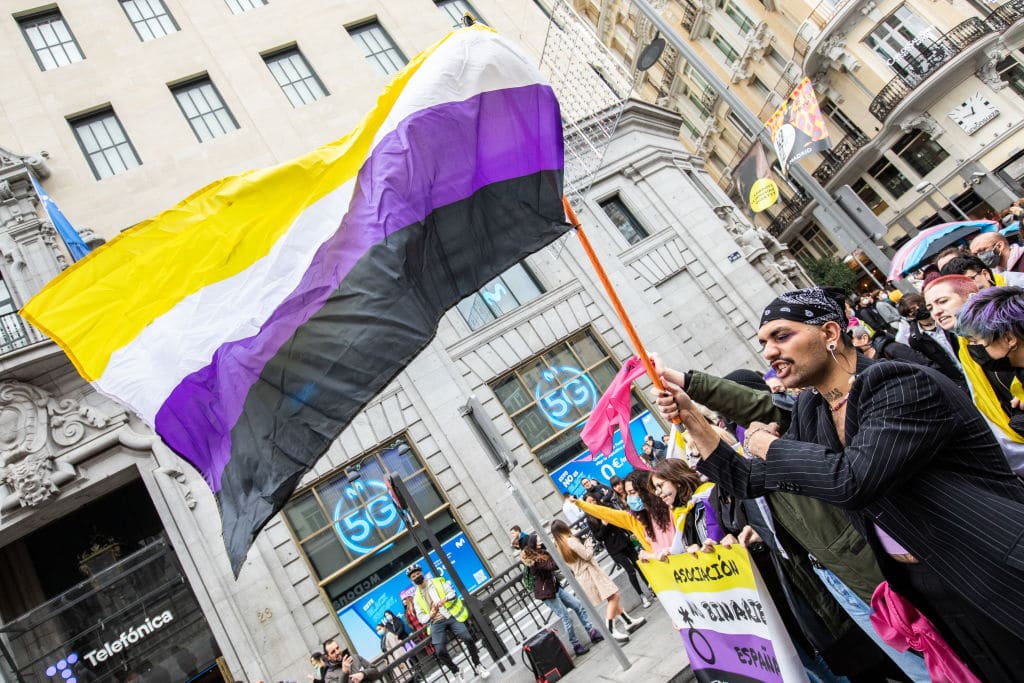Non-binary activist in Madrid, Spain, 2021. (Aldara Zarraoa/Getty Images)
Non-binary people have worse mental health than other genders, according to a new report.
On average, more than one in two non-binary people (51 per cent) are clinically distressed or struggling, the second-ever Mental State of the World Report 2021 found.
The researchers at Sapiens Lab, a non-profit research organisation focused on tracking changes in the mind and brain, released their report on Tuesday (15 March). It’s the world’s biggest and most detail global mental wellbeing study, and saw more than 223,000 people participate between 1 January and 31 December 2021.
In different regions, between 31 per cent and 85 per cent of non-binary people are clinically distressed or struggling, the report, researched by Sapiens Labs, reveals.
Overall the results showed a significant gender gap, with mental wellbeing slightly higher in men than in women, and significantly lower among non-binary people and those who are third gender.
The Mental State of the World Report 2021 used the Mental Health Quotient (MHQ) open online anonymous survey to measure overall wellbeing. Higher scores are associate with a normal range of functioning, while lower scores indicate a negative impact of mental health on the ability to function normally.
Globally, men scored 68 per cent on average while women scored 62 percent – a difference of two percentage points on the MHQ scale.
But globally, non-binary people scored on average just 25 per cent, a 12 to 13 per cent difference from men or women. This pattern was most distinct among young adults, aged 18 to 24, and in Latin American countries.
This finding confirms what other studies have found, which is that non-binary – and trans – people experience worse mental health than their cis peers, be they LGB or heterosexual.
And the pandemic has only worsened this gap, with LGBT+ people facing worsening mental health along with an uptick in abuse and domestic violence during the coronavirus pandemic. Trans people’s mental health was hit during lockdown and many experienced worsened gender dysphoria because of the disruption to gender-affirming care, various pieces of research have found.
While the Mental State of the World Report 2021 didn’t go into what could improve non-binary people’s mental-health outcomes, multiple studies have found that, particularly in young trans people, timely access to gender-affirming care reduces suicidal ideation and depression.
Richer countries experience worse mental health, study suggests
The research found that mental health around the world continued to decline in 2021, although not so dramatically as in 2020 with the onset of the COVID-19 pandemic.
In 2020, the average mental health and wellbeing of participants dropped by eight per cent, driven by lockdowns, social distancing measures, COVID-19 illnesses and deaths.
In 2021, the decline in the world’s mental health continued but at a slower rate, dropping by three per cent.
While the report didn’t go so far as to establish exactly why the pandemic had such an impact on global mental health, it did find that the economic success of a country is negatively correlated to mental health – in other words, the better a country’s economy is doing, the worse the mental health of its population.
This point is supported by the finding that the worst mental health outcomes are in the US, Canada, UK, Ireland, Australia, New Zealand and South Africa – some of the world’s biggest and strongest economies. They are also countries, such as the UK, where a successful economy has driven inequality and a cost-of-living crisis for many.
“This year, the results quite honestly surprised us,” Tara Thiagarajan, founder and chief scientist at Sapien Labs, said in a statement. “It is the first view of the magnitude of differences in mental wellbeing across age groups, genders and countries.
“Overall the findings were surprising and left us to ponder that perhaps our systems of economic growth, values of individualism and a shift from in-person to largely digital interaction fosters an environment of poor mental wellbeing. This data makes clear that, to nurture the human spirit, we need a new paradigm.”
